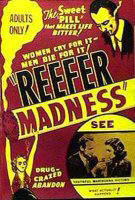In Remembrance: Thelma White
 Thelma White, the RKO contract actress best known for her role in
the 1936 anti-marijuana film Reefer Madness, has passed away
Tuesday, January 11, 2005 in Woodland Hills, California. She was 94.
Thelma White, the RKO contract actress best known for her role in
the 1936 anti-marijuana film Reefer Madness, has passed away
Tuesday, January 11, 2005 in Woodland Hills, California. She was 94.
Born Thelma Wolpa on April 10, 1910 in Lincoln, Nebraska, she was entered into show business at an age 2 by her circus performer parents who traveled throughout the Midwest. By the age of 10, White was singing and dancing in a Vaudeville act called the White Sisters, though she was not related to the other half of the act. After stints performing in the Ziegfeld Follies and Earl Carrol revues, she moved to Hollywood.
Signed to Pathe Studios, later purchased by RKO in 1930, White’s
first two films were short two-reelers, films approximately 20
minutes in length - Ride `Em Cowboy and Sixteen Sweeties
(both 1930). Her feature length debut, a small role in the 1935
crime drama Never Too Late, was an indication of her career
to come as White was never really given a chance to act outside of
small to virtually non-existent supporting roles. The studio also
loaned her out to Vitaphone, for the shorts One Way Out
(1930) and Hot Sands (1931) and MGM, for the short What
Price Jazz (1934), among other studios.

It was in 1935 that White was cast in what would be her most notorious role, that of a hardboiled woman who helps lure several unsuspecting, young high schoolers into the clutches of the “demon weed” marijuana. Released the following year under the title Tell Your Children, the film was written by a church group who wished to present a cautionary tale for teenagers on the perceived dangers of pot. White, however, was reluctant to take the part, but had little choice under her contract.
Filled with wooden acting, overly pretentious dialogue and bad direction, the film flopped in its initial release. It was purchased by an exploitation film distributor who edited in some suggestive sex scenes and exhibited the film in rural areas under various titles such as Dope Addict, Doped Youth and Love Madness.
In 1936, White found herself at Paramount Pictures for small parts in a pair of films- the comedy The Moon’s Our Home and Forgotten Faces.
After the outbreak of World War Two, and perhaps unhappy with the way her career was going, White joined the United Servicemen Overseas, and traveled abroad to entertain servicemen. She returned to Hollywood to only occasionally and between 1942 and 1944 made only four pictures including the East Side Kids feature Bowery Champs (1944) with Leo Gorcey and Huntz Hall.
Towards the end of the war White was stricken with a mysterious, crippling disease while entertaining troops in the Aleutian Islands. She remained bedridden for several years and was told by doctors that she would never walk again. However, she recovered and made one last picture, the musical Mary Lou at Columbia Pictures in 1948, before retiring from acting.
In the 1960s, White returned to show business, this time as a manager for actors such as Debbie Reynolds, Robert Blake, James Coburn, Ann Jillian and Dolores Hart.
Reefer Madness received a second life in 1972 after Keith Stroup, founder of the National Organization for Reform of Marijuana Laws, had discovered a copy of the film in the Library of Congress archives. He purchased a print for $297 and screened it at New York benefit for the group. Robert Shaye, head of the newly formed New Line Cinema, saw thee film and recognized its potential as a camp classic and successfully booked the film onto the college and midnight movie circuits.